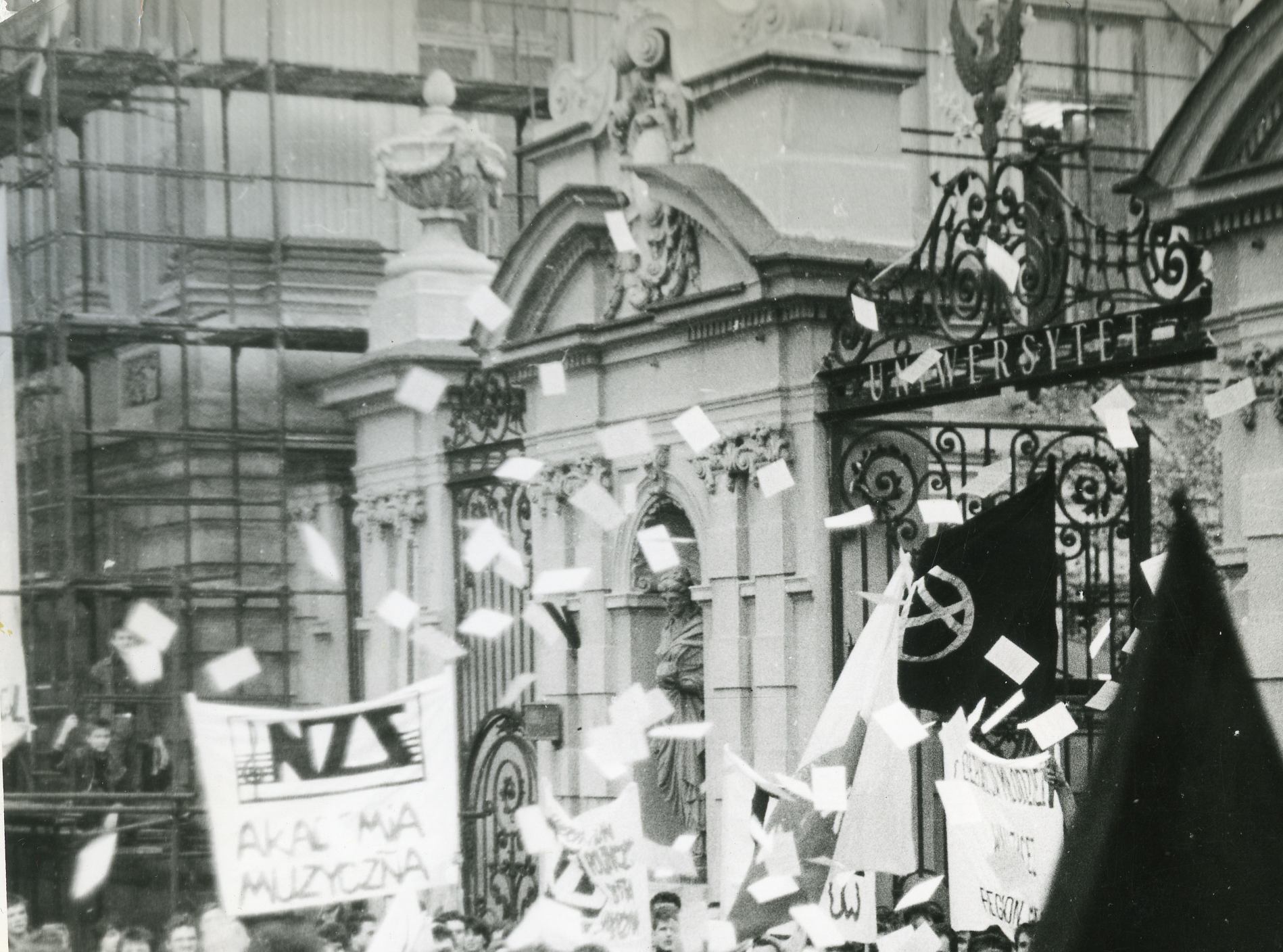The collection contains documentation of the first years of activities and fights of the Warsaw anarchist movement, especially the relatively small but vital collective known as the A-Cyclists. The A-Cyclists group was created in the second half of the 1980s as an unofficial, informal cooperation of adolescent anarchists in Warsaw. Some of them had some experience in political engagement in the pacifist and ecological Freedom and Peace movement or Polish Socialist Party, while others were more invested in punk music and alternative culture. The climax of the A-Cyclists activities came in the period of transition from the state socialism to capitalist liberal democracy (1989-1991). They organised street demonstrations, happenings, and performances, e.g. the huge happening against Chinese government four years after the brutal pacification of the Tiananmen Square protests of 1989. They also published anarchist leaflets and posters and organised discussions in the Institute of Sociology at the University of Warsaw.
Warsaw’s anarchists were a vivid and acute part of so-called ‘youth opposition’ in the late Polish People’s Republic. They had strong relations with punk and new wave fans, who willingly joined anarchists’ happenings and protests due to parallelism of the ideas of anarchism and the visions of independent, autonomous, and rebellious culture among punks. As Tymoteusz Onyszkiewicz said, the anarchists did not have to listen to a punk music, but all punks (except a few Nazi-punks) should be also anarchists. The anarchists participated in protests organised by older groups and parties, such as Polish Socialist Party, Independent Students' Union (ISU), and Freedom and Peace movement. E.g. in 1989 anarchists took part in the occupation of University of Warsaw and protests (including a street battle against police) set up by students fighting for the legitimization of ISU. After 1991 some of the participants of the group joined Anarchist Federation or other alternative movements, but most of them lost interest in radical political actions.
The private archive of the A-Cyclists has been created spontaneously from the beginning of engagement of young radicals in 1987-1988. It contains mainly photos, leaflets, magazines, posters, and articles from the official press, collected by group members, especially Arkadiusz Zajączkowski a.k.a. ‘Owca’. Although the archive has never been formally established, it survived until 2014, when the ‘Fuck 89’ exhibition was organized. However, after that event, many objects from the archive got lost, destroyed or stolen. The character of the collection is transitive – the archive wanders from hands to hands among activists.
The ‘youth opposition’ of the 1980s was a broad formation, including both conservative and progressive groups and movements. Their common feature was radical attitude hostile toward the state after the implementation of martial law and contesting ‘Solidarity’ union for its moderate and restrained strategy. The anarchistic-ecological-punk orientation – according to anthropologist Barbara Fatyga – was an essential part of this formation, with a culmination of their activities in 1989.
They had experienced their childhood under the martial law and mostly got through an initiation on protests set by the left wing of ‘Solidarity’ and especially the radical faction of Polish Socialist Party led by Piotr Ikonowicz. Some of them became activists still in schools, like Piotr Rymarczyk who as a 12-year-old founded Uczniowski Front Odmowy (Pupil’s Refusal Front) in primary schools in Warsaw in 1982. A few years later Rymarczyk was one of the founders of the Intercity Anarchist Federation.
The anarchistic-ecological-punk orientation combined older forms of protest, such as street demonstration or rally, with elements of guerrilla theatre, happening, street party, and rock concert. As Fatyga wrote in her book about the youth culture in Poland, while the conservative, nationalist groups and movement talked a lot about ‘independence’, Christian values and anticommunism, the meta-category of anarchists’ statements was ‘freedom’, by which they meant especially ecology, human rights, and anti-clericalism.
Sources:
Tymoteusz Onyszkiewicz, “Czas: anarchia, tryb: rewolucja. Wspomnienia warszawskiego anarchisty 1989-1991”, 2014.
Barbara Fatyga, “Dzicy z naszej ulicy. Antropologia kultury młodzieżowej”, 1998.
Adam Ryć, Arkadiusz ‘Owca’ Zajączkowski, “Protesty, sabotaż i ZOMO”, Anarchist Federation, http://www.federacja-anarchistyczna.pl/index.php/wybory/item/889-protesty-sabotaz-i-zomo.

